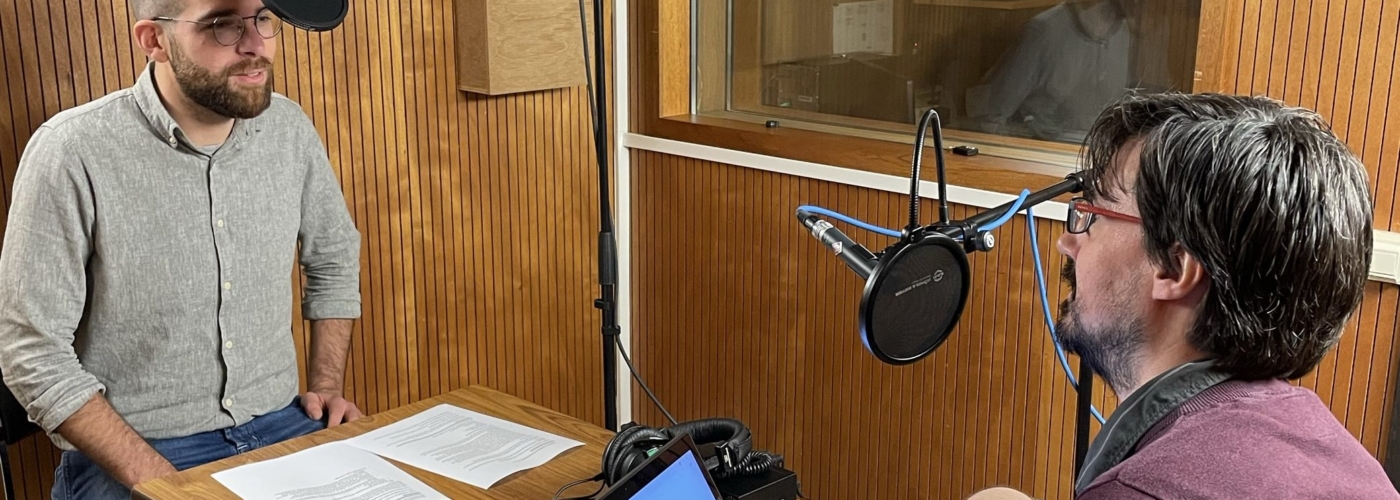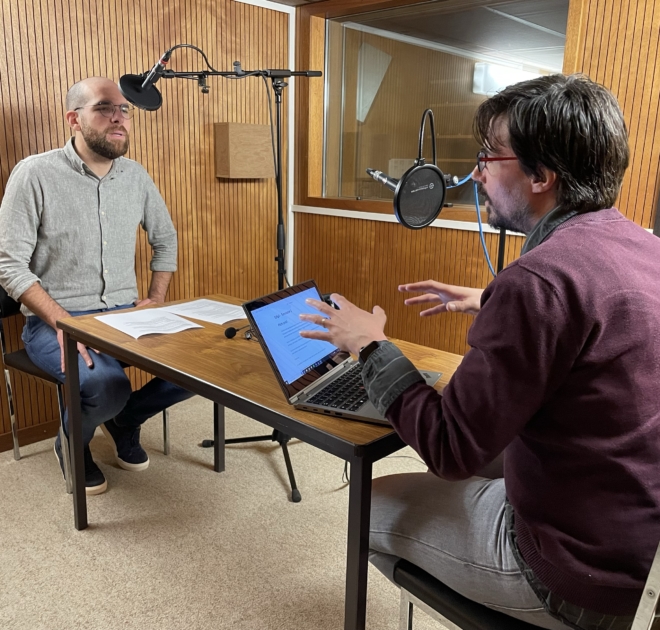Pop-Code, a podcast which deciphers pop-culture cinema and digital technology

Article author :
The Pop-Code podcast uses the evocative power of pop culture to provide educational insights into digital technology, at the same time as examining its key issues and limits.
An open-space office at the UNamur computer science faculty, a shared passion for pop culture and cinema, rousing discussions. The planets aligned perfectly for Benoît Vanderose and Anthony Simonofski to become friends. Each of them subsequently took their own individual research pathway, with the former becoming a lecturer in software engineering, whilst the latter became a lecturer in digital transformation and smart cities. The thought of carrying on with their discussions of their shared passion kept gnawing away at them. So the two thirty-somethings had the bright idea of creating a podcast. On the schedule, films addressing the digital world, naturally, and the ways in which reality and fiction mutually mould each other. And so Pop-Code was born.
At the end of one year of existence, the channel boasts 10 episodes, with a length of around 40 minutes. Each one presents a film from the world of popular culture (Terminator, Ex-Machina, Snowden, Minority Report, etc.) and examines a key issue of digital technology (AI, ethics in the use of data, whistle-blowers, predictive policing, etc.) addressed within it.

‘What we especially get a kick out of is bringing to people’s attention an entertaining film we have really liked. But also trying to get our listeners to reflect on the impact of the digital on society, to have them acquire a critical mind. As academics, we consider our podcast as a public service mission for society, by means of popularising certain concepts. All the same, we produce it in our spare time. It’s a real pleasure, and we want it to remain so. It is also for that reason, to avoid putting any pressure on ourselves whatsoever, that we only make a single episode per month.’
Precious technical support
To obtain some back-up for their project, the two friends went knocking on the door of the UNamur audiovisual department. It is in its recording studio that the podcasts are put together. ‘We go in at 12.00, and we leave at 13.00,’ smiles the smart cities specialist. ‘The recording is done without any cutting. We were really keen on keeping the hesitations and gaps, we love this ‘recorded live’ aspect. The audio recording and the editing are handled by Valentin Meys, a sound engineer. He’s the one who created our amazing, quite futuristic credit titles.’

‘For the rest, it’s a matter of producing it ourselves. We cobble something together on a single licence to transmit the podcast. Benoît prepares the visuals whilst I write the descriptions.’
Upstream work
To prepare an episode, they each watch the film of the month separately, on their own. They make notes on the subjects which to them seem relevant to highlight in the podcast episode. And develop their talking points without discussing them with the other person. ‘It matters to us that our analyses and opinions are completely individual.’
‘Personally, to stock up on subject matter, I carry out research through various channels: I watch the film’s ‘the making-of’, what the directors and the actors have said about it. Once the themes have been clearly identified, I take a look at the academic literature. That way, the podcast puts out certain interesting research results related to the film’s themes,’ continues Anthony Simonofski.
Pop culture as an awareness raising tool
Let’s take the example of the film ‘Her’, looked at in episode 9. It’s the story of a man who falls in love with an artificial intelligence on his mobile phone. ‘That led us to try to find out more about the very real phenomenon of virtual girlfriends manufactured by AI. And we do mean girlfriends, specifically, because it is above all young heterosexual men who resort to them. There is a whole academic literature on the subject, analysing the interactions between the human and the virtual being (the AI is programmed to please its user). As well as on the implications for relationships with real people, particularly with women.’ No less than 10 million people globally make use of emotional support chatbots. In other words, personalised AIs which simulate a person to talk to.
‘We are convinced that popular culture is a very good means of raising awareness and a key vector of engagement. And here I am not solely talking about the digital technology theme. For example, ‘Brokeback Mountain’, which tells the story of a relationship between two men, offered great visibility to the homosexual cause in the United States. Likewise, ‘Don’t Look Up’, released on Netflix, a film dealing with a comet on a path to obliterate the Earth, made people aware of the widespread obliviousness as regards global warming and the disasters which result from it.
More diversity to come
During the first season of Pop-Code, only American science-fiction blockbusters were slated on the schedule, as well as the series ‘Black Mirror’. ‘For the second season, which starts in March 2024, we have set ourselves the mission of diversifying the provenance of the films, as well as taking a look into European and Japanese cinema.’
‘That will allow us to diversify the subjects we tackle. In fact, American films essentially focus on AI. And they do so because that is the technology which is currently whipping up discussions the most. But, to avoid repeating ourselves and to provide more variety, we will take care in the future to select films which address other subjects, such as virtual reality, the metaverse, the digital divide, cybersecurity, or the Internet of Things,’ explains Anthony Simonofski.

Experts will also be invited more frequently. A successful pilot trial was carried out with the podcast’s episode on Snowden, with Amélie Lachapelle, a lecturer in law who specialises in whistle-blowers (UNamur), dropping by the studio. ‘Neither Benoît or I are experts in everything, quite obviously. And we have numerous colleagues who are lot more clued up on cybersecurity and other themes. The idea for this new season is to use the films as a relay to bring an even more in-depth expertise on certain subjects.’
‘We also want to communicate more with our community. We are going to continue partnering with the Alumni Association of the UNamur Computer Science Faculty. It organises cine-debates. It’s an amazing format which, once the film has been viewed on a large screen, enables people to discuss it over a drink.’
Pop-Code met with wonderful success in 2023. As Benoît Vanderose and Anthony Simonofski were able to discover during the SETT (School, Education, Transformation, Technology) Fair. ‘Several secondary education teachers came looking for us to tell us that the podcast is great. And that they were going to use it to work up a few lines of argument to launch a debate with their pupils. Or even ask them to listen to the podcast and then debate it in the classroom. Meeting them really motivated us.’
To your headphones to discover the new season!
A story, projects or an idea to share?
Suggest your content on kingkong.





